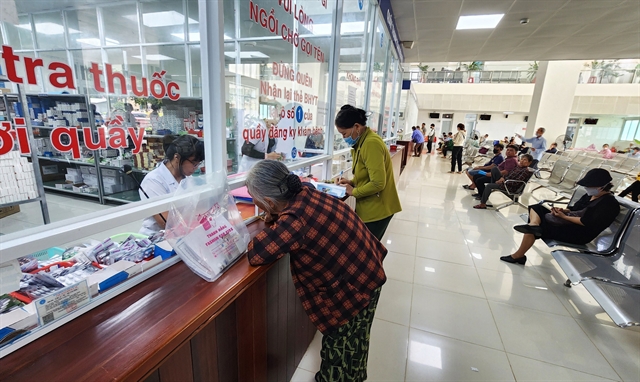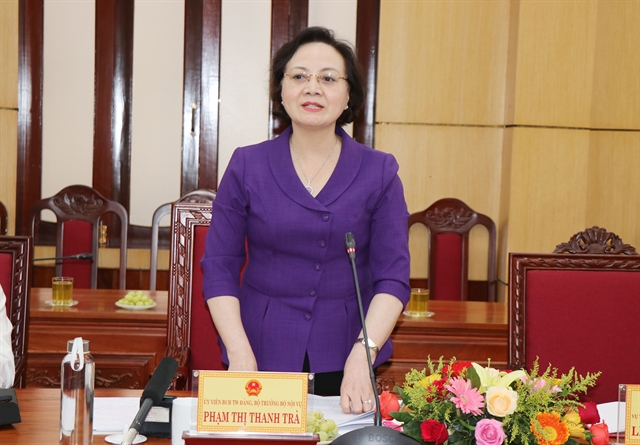 Opinion
Opinion

 |
| Phạm Thị Thanh Trà, Minister of Home Affairs. — VNA/VNS Photo |
Minister of Home Affairs Phạm Thị Thanh Trà talks to the media about the sector's achievements in 2023 and its tasks in 2024.
Could you please provide some insight into how provinces and cities have been reporting their plans for organising district and commune-level administrative units to the Ministry thus far? Has there been any deviation from the original projections regarding the number of communes and districts slated for merger?
Organising district and commune-level administrative units stands as a pivotal task for both the Ministry of Home Affairs and localities in 2024. By December 31, 2023, all 56 localities have submitted their plans for the 2023-2025 period to the Ministry of Home Affairs for review.
Following a comprehensive review of these plans, the Ministry of Home Affairs has issued feedback on the proposed strategies for all 56 provinces and cities. Upon synthesis of these plans, adjustments have been noted in the number of district and commune-level administrative units set for restructuring compared to initial estimations.
As anticipated, between 2023 and 2025, the nation was projected to restructure a total of 33 district-level administrative units and 1,327 commune-level administrative units. However, following the review of the overall plans, it was found that the total number of district-level administrative units earmarked for restructuring stands at 50. Among these, 11 units are designated for immediate restructuring, 16 are encouraged to do so, and 23 are advised to consider merging with adjacent units. The restructuring of 19 units was deferred due to specific circumstances. Consequently, it is projected that the nation will reduce its district-level administrative units by 14 post-restructuring.
Similarly, the total number of commune-level administrative units undergoing restructuring is now 1,243. Of these, 738 units are slated for restructuring, 109 are encouraged to do so, and 396 are advised to consider adjacency mergers. Additionally, 515 units were not included in the restructuring plans due to specific constraints. It is estimated that following restructuring and mergers, the nation will see a reduction of 619 commune-level administrative units.
These figures highlight a significant number of district and commune-level administrative units that localities have voluntarily proposed for rearrangement. Notably, 16 district-level administrative units and 109 commune-level administrative units, although not mandated for restructuring, have been suggested for rearrangement by the respective localities.
Moreover, despite the potential for rearrangement at both district and commune levels, certain units have been exempted from this process based on thorough evaluations of specific cultural and historical factors by the localities.
In sum, considering these dynamics, it appears that the overall tally of district and commune-level administrative units arranged and merged in 2024 will remain relatively consistent with the initial estimates.
Recently, there has been speculation circulating on social media regarding the potential rearrangement and merging of certain provinces. Could you shed light on the validity of these claims?
This is indeed a matter of concern for many provinces and cities, prompting inquiries to the Ministry of Home Affairs. However, it's imperative to clarify that the Ministry of Home Affairs has neither initiated nor proposed any plans for the rearrangement or merger of provinces or cities.
Regrettably, there has been a proliferation of misinformation on social media platforms suggesting mergers between provinces. I want to emphasise that these claims are entirely baseless and inaccurate. Such unfounded rumours have led to unwarranted worry and actions among residents of some provinces, negatively impacting social sentiment.
Could you provide an update on the current status of organisational arrangements within ministries, branches and provincial-level specialised agencies?
At present, the organisational restructuring within ministries, branches (including general departments and departments), and provincial-level specialised agencies (departments and sectors) has reached a significant level of completion, with only a few outstanding tasks remaining. Specifically, we are actively addressing the remaining orders. Regarding career positions within ministries, ministerial-level agencies and Government entities, our focus will be on further organisational adjustments throughout 2024.
Anticipated outcomes of these arrangements include the reduction of approximately 140 public service units of ministries and branches. Concurrently, we are committed to fostering the autonomy of public service units, with the aim to achieve full autonomy for 63 per cent of public service units under ministries and ministerial-level agencies by 2025.
One of the Ministry of Home Affairs' pivotal and routine responsibilities involves the development and refinement of institutional frameworks concerning organisational structures, cadre management, civil servants and public employees. How does the ministry plan to undertake this task in 2024?
Currently, our primary focus is on diligently advancing the study and formulation of proposals aimed at amending key legislation, notably the Law on Cadres and Civil Servants by October 2024. Additionally, we are addressing revisions to the Law on Public Employees, the Law on Government Organisation, and the Law on Local Government. Particular emphasis is placed on enhancing the efficacy of decentralisation efforts, redistributing power, and modernising administrative practices from central to local levels.
In tandem with institutional development, we are committed to refining policies aimed at attracting and effectively deploying talented individuals. This involves ongoing innovation within the civil service framework, alongside the crafting of criteria, standards and specific regulations. These guidelines will serve as a basis for ministries, branches and localities in assessing promotions for civil servant professional titles, as well as deliberating the elevation of civil servant ranks.
We are dedicated to ensuring accurate and equitable evaluations, while simultaneously fostering motivation among officials and civil servants to excel. For individuals who demonstrate dedication in aligning with the guidance of esteemed experts, due recognition will be granted. Conversely, for those exhibiting aptitude and potential, a focus will be placed on their training, development, strategic placement and potential elevation to leadership roles.
In 2023, the Ministry of Home Affairs emerged as one of the standout ministries, achieving comprehensive success and having a significant impact, as noted by Deputy Prime Minister Trần Lưu Quang during the sector review conference. Could you talk about the factors contributing to this achievement?
It is undeniable that in recent years, the Ministry of Home Affairs has consistently prioritised innovative approaches to leadership, direction and administration. We have adopted a concentrated, decisive, hands-on and goal-oriented approach, with a keen focus on advising and orchestrating the implementation of the Party's major policies within our domain. Simultaneously, we remain agile in addressing practical challenges to meet both immediate and long-term strategic objectives.
Recognising the critical role of coordination in executing tasks assigned by the Government and Prime Minister, we consistently advocate for ministries, branches and localities to adhere to timelines and deliver results effectively.
Consequently, our commitment to maintaining robust coordination mechanisms with other stakeholders, coupled with prompt exchange and response to recommendations and proposals, has fostered unity and transparency in the execution of tasks. Notably, our efforts in resolving interdisciplinary challenges have yielded promising outcomes.
Guided by this steadfast spirit, the entire home affairs sector is poised to vigorously implement the resolutions set forth by the 13th Party Congress. Our action motto, "Discipline, exemplary, professional, effective," encapsulates our commitment to driving positive, resilient and impactful change across all facets of state management within the ministry and the broader home affairs sector in 2024. — VNS




